Powerful Foods and Supplements for Skin Wellness
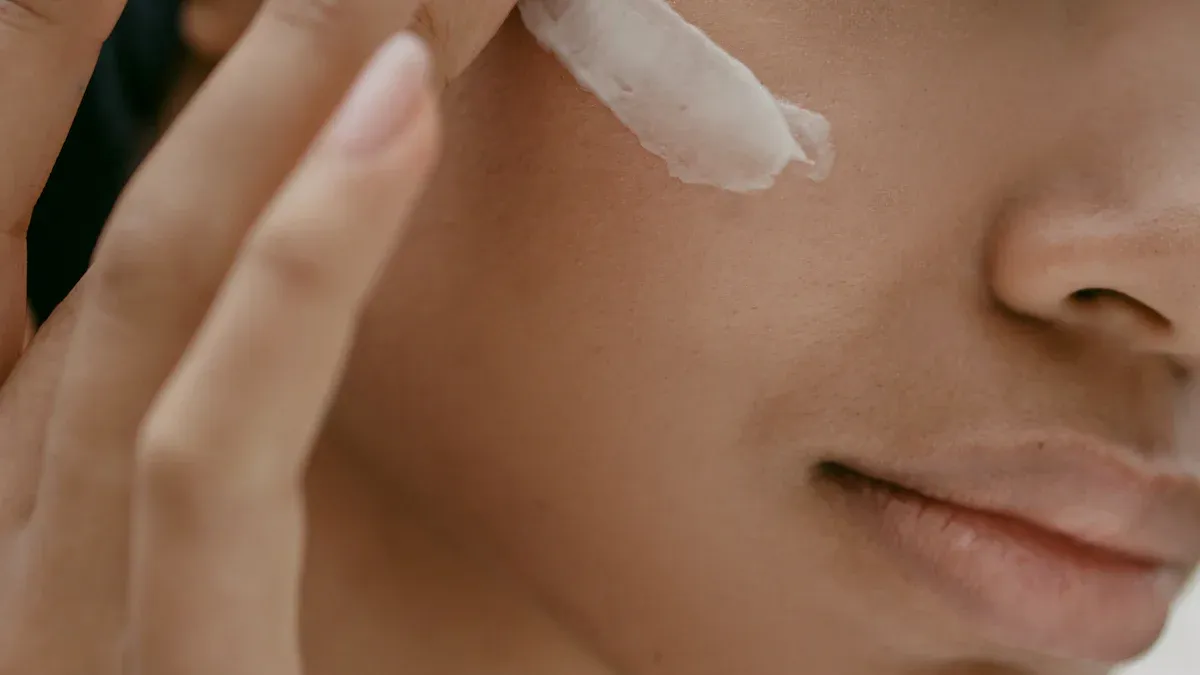
You may ask which foods and supplements to support healthy skin. Studies show that your diet matters a lot. You should eat more of these foods and supplements to support healthy skin:
Fatty fish and walnuts provide you with healthy fats
Avocados and sunflower seeds are rich in vitamin E
Sweet potatoes, bell peppers, and tomatoes add color and antioxidants
Broccoli and dark chocolate offer extra protection
Eat whole foods with lots of colors. Try to keep your meals balanced. Eating these foods and supplements to support healthy skin often and in moderation helps your skin look good.
Key Takeaways
Eat many kinds of colorful fruits and vegetables. They give your skin important vitamins and antioxidants.
Drink enough water every day. Eat foods with lots of water, like cucumbers and watermelon.
Try not to eat too much sugar or processed foods. This helps lower inflammation and stops skin problems like acne and early aging.
You can take supplements like omega-3 fatty acids and vitamins C and E. These help if you do not get enough from food. But eating whole foods is better.
Keep track of what you eat and how your skin looks. This helps you find what is best for your skin health.
Why Diet Matters
Skin and Nutrition
You might wonder why your diet has such a big impact on your skin. The truth is, what you eat shows up on your face. If you fill your plate with whole, minimally processed, and organic foods, you give your skin the best chance to glow. These foods are packed with vitamins, minerals, and antioxidants that help your skin fight off damage and stay healthy. Brightly colored fruits and vegetables—like berries, carrots, and leafy greens—are loaded with carotenoids, polyphenols, and other health-promoting compounds. This is called the "eat the rainbow" approach. When you eat a variety of colors, you get a mix of nutrients that support your skin from the inside out.
Tip: Try adding at least three different colors to your meals each day. Your skin will thank you!
Let’s look at how different dietary choices affect your skin:
Impact on Skin Appearance and Function |
|
|---|---|
Unhealthy Diet |
Uneven skin tone, roughness, dryness, and loss of elasticity due to dehydration. |
High Dietary Fat Intake |
Negative effects on skin aging, increased oxidative stress, and slower skin healing. |
Refined Sugar Consumption |
More signs of skin aging and a higher chance of acne. |
Alcohol Consumption |
Damages skin barrier and changes skin permeability. |
Gut Health |
Poor gut health can trigger immune responses and lead to skin issues like rosacea and eczema. |
Your gut and skin are connected. If your gut is healthy, your skin looks better. A balanced microbiome supports healthy skin appearance. When you choose a diet rich in whole foods, you help your gut and your skin.
Nutrients like vitamins C and E are key for collagen production and skin cell growth. They help your skin stay firm and smooth. Supplements can help fill gaps if you don’t get enough from food, but proper nutrition from whole foods works best.
Impact of Hydration
Water is your skin’s best friend. If you drink enough, your skin stays bouncy and resilient. Well-hydrated skin keeps moisture in and blocks harmful stuff out. Water helps your skin cells do their job and keeps your skin looking fresh.
Here’s how hydration helps your skin:
Helps skin hold moisture and keep out irritants.
Supports skin cell processes and overall health.
If your skin looks dull, feels dry, or shows more fine lines, you might need more water. Try sipping water throughout the day. You can also eat water-rich foods like cucumbers and watermelon. Supplements are not a substitute for hydration, but they can support your skin when paired with a healthy diet.
Key Nutrients
Essential Vitamins
Your skin loves vitamins. You get the best results when you focus on a balanced diet full of colorful fruits and vegetables. Supplements can help if you have gaps, but food should come first. Here are the most important vitamins for healthy skin:
Vitamin A helps your skin repair itself and keeps it smooth.
Vitamin C supports collagen production, which keeps your skin firm and elastic.
Vitamin E protects your skin from damage caused by free radicals.
Vitamin D keeps your skin healthy and can help with dryness.
If you do not get enough of these vitamins, your skin may look dull, dry, or even break out. For example, a lack of vitamin C can slow healing, while low vitamin A can cause flaky skin.
Tip: Try to eat a variety of fruits and vegetables every day. This helps you get all the vitamins your skin needs.
Important Minerals
Minerals play a big role in keeping your skin strong and glowing. You can get most of these from a good diet, but sometimes supplements are helpful, especially if you have special needs.
Zinc calms irritation and helps repair damaged skin.
Magnesium reduces inflammation and keeps your skin hydrated.
Calcium supports firmness and helps your skin cells stick together.
Iron gives your skin a healthy color and fights dullness.
Selenium protects your skin from stress and redness.
Silica strengthens your skin and improves texture.
If you do not get enough minerals, you might notice more acne, eczema, or even pale and itchy skin. Women often need more iron and B vitamins, especially during childbearing years. Men may need more protein and healthy fats to support their skin.
Antioxidants
Antioxidants are your skin’s shield. They fight off things that make your skin age faster, like pollution and sun. You find antioxidants in foods like berries, nuts, and leafy greens. Some supplements also offer extra support.
Antioxidants defend against early aging and keep your skin structure strong.
They brighten your skin and help fade dark spots.
They calm redness and irritation.
Vitamin C, vitamin E, and niacinamide are some of the best antioxidants for your skin. They help your skin stay smooth, hydrated, and even-toned.
Note: Combining sun protection, a healthy diet, and antioxidants gives your skin the best chance to stay youthful.
Healthy Fats
Healthy fats are key for soft, hydrated skin. Your diet should include foods like fatty fish, walnuts, flaxseed, and avocados. These foods give you essential fatty acids, like omega-3 and omega-6, which help your skin hold moisture and reduce redness.
Essential fatty acids from plant oils build your skin’s barrier.
Omega-3s from fish oil or flaxseed help calm inflammation and keep your skin hydrated.
These fats also help your skin heal and stay smooth.
Supplements with omega-3s can help if you do not eat enough fatty fish. Remember, food is always the best source, but supplements can fill in the gaps.
Foods and Supplements to Support Healthy Skin
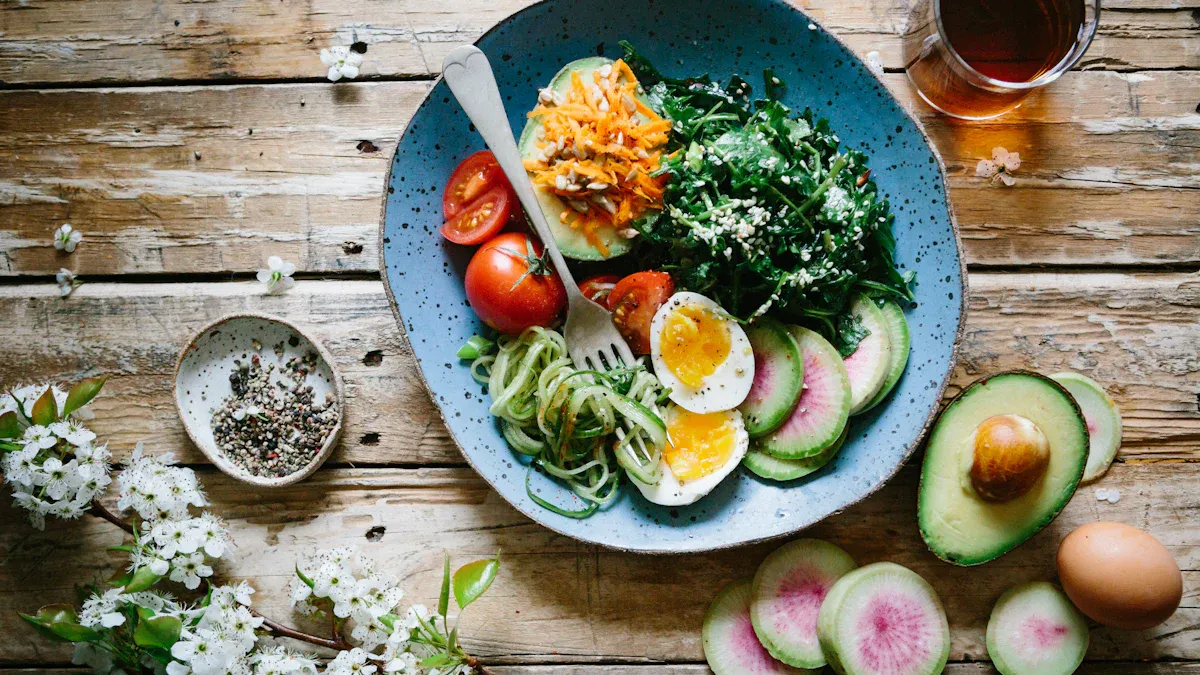
Best Foods for Skin
You can make a big difference in your skin just by choosing the right foods and supplements to support healthy skin. When you fill your plate with colorful fruits, vegetables, whole grains, lean proteins, and healthy fats, you give your skin the nutrients it needs to look its best. A plant-based diet works wonders for your skin. You get antioxidants, vitamins, and fiber that help your skin fight off damage from the sun and pollution.
Here are some of the best foods and supplements to support healthy skin:
Fruits: Berries, oranges, kiwis, and papayas are packed with vitamin C and antioxidants. These help your skin stay bright and even.
Vegetables: Leafy greens like spinach and kale, sweet potatoes, carrots, and bell peppers give you vitamins A and E. These keep your skin smooth and help it repair itself.
Whole Grains: Brown rice, quinoa, and oats provide fiber and B vitamins. These support your skin’s barrier and help it stay hydrated.
Lean Proteins: Chicken, turkey, eggs, tofu, and legumes help your skin build new cells and heal faster.
Healthy Fats: Avocados, walnuts, flaxseeds, and olive oil give you omega-3 and omega-6 fatty acids. These fats lock in moisture and calm redness.
Fermented Foods: Kimchi, sauerkraut, and yogurt support your gut health. A healthy gut can lead to clearer skin.
Tip: Try to eat a rainbow of fruits and veggies every day. Your skin loves variety!
Supplements can help if you have gaps in your diet. For example, if you do not eat much fish, you might take an omega-3 supplement. If you avoid dairy, a vitamin D supplement could help. Always remember, foods and supplements to support healthy skin work best together. You should use supplements to fill in the blanks, not to replace real food.
Foods to Limit
Some foods can make your skin problems worse. If you eat a lot of sugar or unhealthy fats, you might notice more breakouts, redness, or signs of aging. Foods and supplements to support healthy skin work best when you also cut back on things that harm your skin.
Here’s why you should limit certain foods:
Fried and processed foods can cause inflammation. This leads to redness and acne.
Foods high in sugar, like candy, soda, and pastries, spike your blood sugar. This makes your skin produce more oil and can cause breakouts.
Refined carbs, such as white bread and chips, act like sugar in your body. They can make your skin oily and trigger acne.
Too much dairy can cause inflammation and breakouts for some people.
Alcohol dries out your skin and makes it harder for your body to absorb nutrients.
Check out this table to see how some foods affect your skin:
Food Type |
Effect on Skin Health |
|---|---|
Sugar and Refined Carbs |
Damage collagen and elastin, cause premature aging, and increase inflammation. |
Dairy Products |
Can trigger inflammation and acne in some people. |
Excessive Alcohol |
Dehydrates skin, blocks nutrient absorption, and increases inflammation. |
Processed Foods |
Often contain unhealthy fats and lack nutrients your skin needs. |
When you eat too much sugar or unhealthy fat, your body makes chemicals that cause inflammation. This can lead to more acne, redness, and even make your skin age faster. High-fat diets can also cause oxidative stress, which damages your skin cells.
Mechanism |
Description |
|---|---|
Oxidative Stress |
High-fat diets damage skin cells and speed up aging. |
Glycation |
Too much sugar harms collagen and elastin, leading to wrinkles and inflammation. |
If you want to see real changes, focus on foods and supplements to support healthy skin and try to limit foods that cause problems. You do not have to be perfect. Just making small changes in your diet and using supplements wisely can help your skin look and feel better.
Note: Always talk to your doctor before starting new supplements, especially if you have health conditions or take medication.
Nutritional Supplements for Skin Health
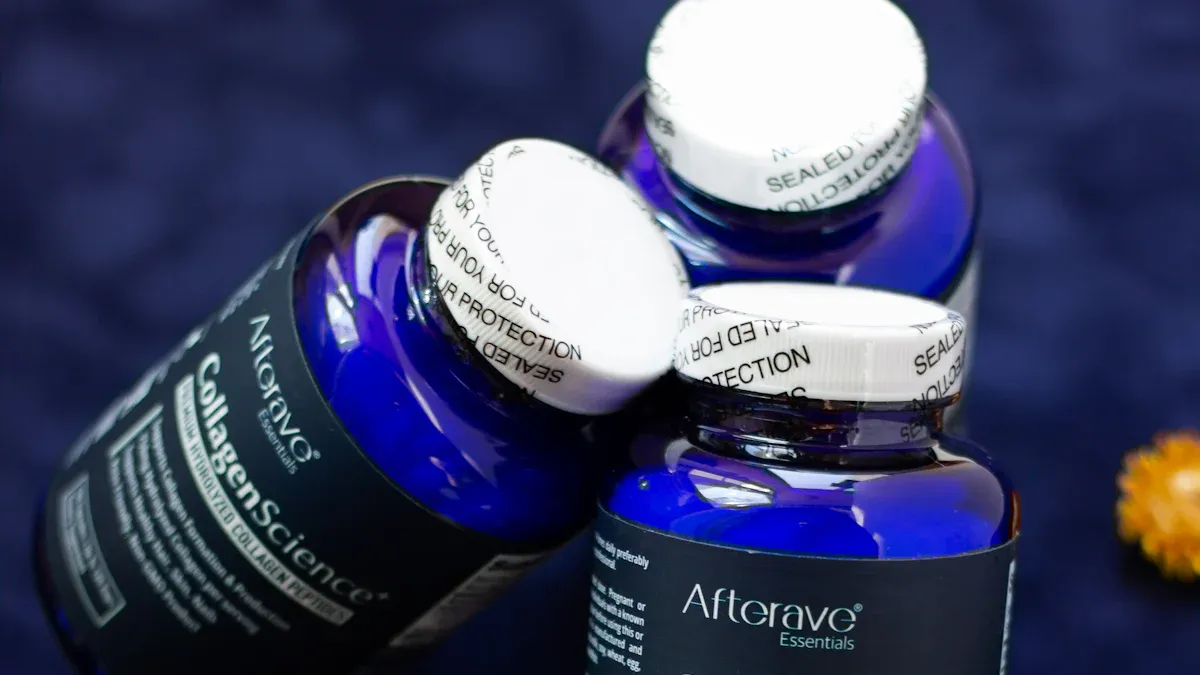
Top Supplements
You might wonder which nutritional supplements for skin health really help. There are many choices in stores, but not all work well. Some have more proof that they help your skin.
Phosphatidylcholine (PC) helps fix your skin and makes its barrier stronger. It also helps your body use nutrients better.
Balance Oil is full of omega fats. It feeds your skin cells and calms swelling.
Liposomal Vitamin C is needed to make collagen and fix your skin.
Vitamin D keeps your bones strong and lowers swelling in your skin.
Vitamin E is an antioxidant. It fights swelling and helps your immune system.
Biotin helps your skin and makes hair and nails grow.
Collagen is important for your skin. It can help your skin look smooth and firm.
Omega-3 fatty acids lower swelling and help with dry or itchy skin.
You can buy these dietary supplements as capsules, liquids, tablets, or gummies. Some people like gummies because they taste good. Others pick capsules because they are easy to take.
Tip: Always read the label. Pick the form and dose that fits you.
Here is a table that shows how much vitamin E you need each day:
Age |
RDA (milligrams/mg) |
|---|---|
Birth to 6 months old |
4 mg |
Infants 7 to 12 months old |
5 mg |
Children 1 to 3 years old |
5 mg |
Children 4 to 8 years old |
7 mg |
Children 9 to 13 years old |
11 mg |
Ages 14+ |
15 mg |
While pregnant |
15 mg |
While breastfeeding |
19 mg |
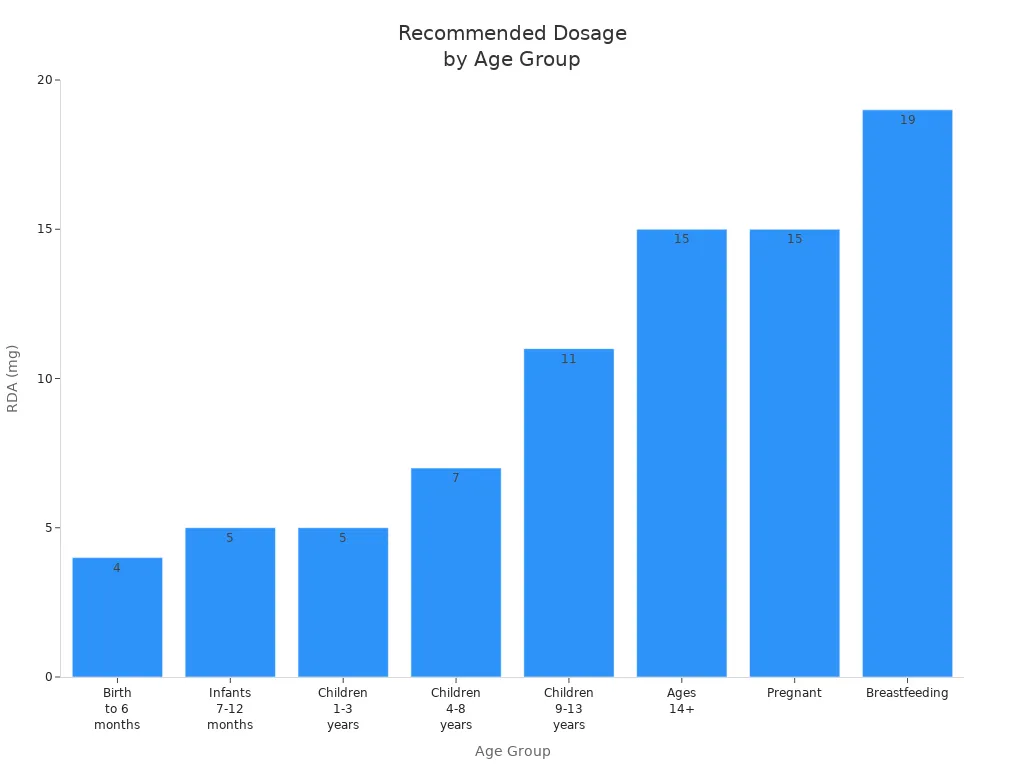
Dietary supplements work best with a healthy diet. Whole foods with bright colors give you antioxidants, carotenoids, and polyphenols. These help your skin stay healthy. Eating many colors is a smart way to get different nutrients. Men and women need different things. Women often need more iron, folic acid, and B vitamins. Men need more protein, healthy fats, and micronutrients.
Safe Supplement Use
You want your skin to look good, but too many dietary supplements can hurt you. Some people think taking more is better, but that is not true. Too much of some nutritional supplements for skin health can be bad for your skin.
Too much vitamin A can make your skin itch, peel, and hurt in sunlight.
Taking too much biotin can cause rashes and other problems.
High zinc can cause skin issues by lowering copper in your body.
Other risks are:
Too much selenium can cause hair loss, nail changes, stomach pain, tiredness, and even garlic breath.
Too much niacin can make your skin red and, over time, cause bad skin problems.
High zinc can block copper, causing pale skin and slow healing.
Too much collagen can cause allergies or stomach pain.
Some performance supplements have unsafe things that can cause acne and hair loss.
There is a lot of wrong health info online. You see ads and posts that promise big results from dietary supplements, but many are not true. If you follow bad advice, you can get skin problems or even get sick. Always check facts and talk to a doctor before starting new supplements.
How can you use dietary supplements safely? Experts say to do these things:
Do not use supplements instead of real food. Food comes first.
Check the dose. Pick supplements that match what you need and do not go over.
Add up all your supplements. Make sure you know your total amount.
Do not believe big promises. Some products say too much.
Look for third-party testing. This helps you know it is safe and real.
Pick a multivitamin that fits your age, gender, and health.
Talk to your doctor or pharmacist. They can help you avoid problems with medicines or health.
Note: Be steady and do not take too much. You get the best results when you eat well, pick smart supplements, and check with your doctor.
You can help your skin with the right dietary supplements, but food should come first. Supplements fill in gaps in your diet, but they are not magic. When you eat whole foods and use supplements the right way, your skin has the best chance to glow.
Daily Integration Tips
Simple Meal Ideas
You want to know how to eat for healthy skin. Start your day with breakfast. Try Greek yogurt with berries and walnuts. This gives you probiotics, antioxidants, and healthy fats. For lunch, make a salad with spinach, avocado, bell peppers, and grilled chicken. You get vitamins, minerals, and lean protein. Snack on cucumbers or watermelon. These foods give you water and antioxidants. For dinner, eat salmon with sweet potatoes and leafy greens. This meal gives you omega-3s, vitamin A, and vitamin C.
Here’s a table to help you pick foods for better skin:
Food Item |
Benefits |
|---|---|
Avocados |
Give vitamin E, an antioxidant that may lower oxidative stress. |
Berries |
Have antioxidants that protect skin from things in the environment. |
Nuts and seeds |
Give zinc and selenium, which help skin repair and control swelling. |
Leafy greens |
Have vitamin C, which helps make collagen for firmer skin. |
Fatty Fish |
Give omega-3 fatty acids, which help control oil and lower redness. |
Tip: Eat lots of colors! Bright foods have antioxidants and help your skin glow.
Supplement Routine
Supplements can help if you do not get enough from food. You might take probiotics in the morning for your gut and clear skin. Omega-3 supplements work well with breakfast or lunch. Collagen powder mixes into smoothies or coffee. Green tea extract and turmeric supplements help lower swelling and protect your skin. Hyaluronic acid supplements keep your skin moist and stretchy. Selenium supplements help make collagen and protect against skin infections.
Here’s a table to help you plan your supplements:
Supplement |
Benefits |
|---|---|
Probiotics |
Help gut health, lower swelling, clear skin, and help with skin problems. |
Turmeric |
Lowers swelling and helps with skin issues like psoriasis and eczema. |
Green Tea Extract |
Has antioxidants, lowers swelling, protects from UV, and helps skin tone. |
Hyaluronic Acid |
Keeps skin moist, stretchy, and helps with fine lines. |
Selenium |
Gives antioxidants, helps make collagen, and protects from skin infections. |
Omega-3 Fatty Acids |
Feed skin, lower swelling, help skin texture, and support the barrier. |
Collagen Supplements |
Help skin stay moist, stretchy, and hydrated, and lower wrinkles and fine lines. |
Note: Always talk to your doctor before new supplements, especially if you take medicine or have health problems.
Tracking Progress
You want to know if your diet and supplements work. Keep a simple journal. Write down what you eat and which supplements you take each day. Take a selfie once a week to see changes in your skin. Notice if your skin feels smoother, looks brighter, or has fewer breakouts. If you see good changes, keep going. If not, change your routine. Drink water and eat many whole foods. Remember, being steady is more important than being perfect.
📅 Set a reminder to check your progress every month.
📝 Write down changes in skin texture, moisture, or clearness.
💧 Drink lots of water and eat foods with lots of water, like fruits and veggies.
Small changes in your diet and supplements can make your skin better over time.
You can help your skin by eating colorful foods. Sweet potatoes, berries, and leafy greens are good choices. Try these steps:
Pick foods with lots of vitamins and antioxidants.
Keep a balanced routine and be proud of small steps.
Change your meals slowly and plan ahead for busy times.
Ask a dermatologist before making big changes to your diet or supplements.
Consistency |
Moderation |
Professional Help |
|---|---|---|
Makes skin strong |
Stops problems |
Gives you a plan |
Food is most important. Supplements only help if you need more. If you make smart choices often, your skin will look better!
FAQ
What foods help your skin the most?
You get the best results from whole foods. Eat lots of fruits, vegetables, lean proteins, and healthy fats. Try to pick different colors. This gives you more antioxidants and nutrients. Organic and minimally processed foods work best.
Should you take supplements for skin health?
Supplements can help if you miss key nutrients. Food should come first. Use supplements only to fill gaps. Always check with your doctor before starting new ones.
How much water should you drink for healthy skin?
Most people need about 8 cups of water each day. You can also eat water-rich foods like cucumbers and watermelon. Staying hydrated keeps your skin soft and bright.
Do men and women need different nutrients for skin?
Yes! Women often need more iron, folic acid, and B vitamins, especially during childbearing years. Men need more protein, healthy fats, and micronutrients. Your needs may change with age.
Can eating too much sugar or junk food hurt your skin?
Yes, it can. Sugar and processed foods may cause breakouts and make your skin age faster. Try to limit these foods. Choose whole, colorful foods for better skin.
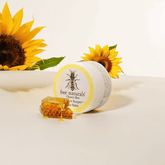

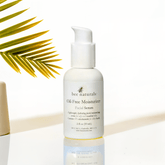

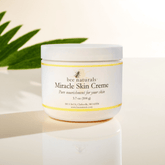


Leave a comment
Please note, comments need to be approved before they are published.